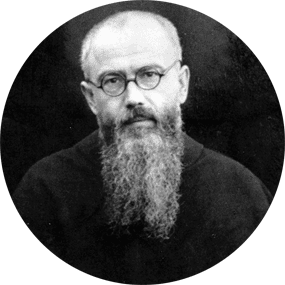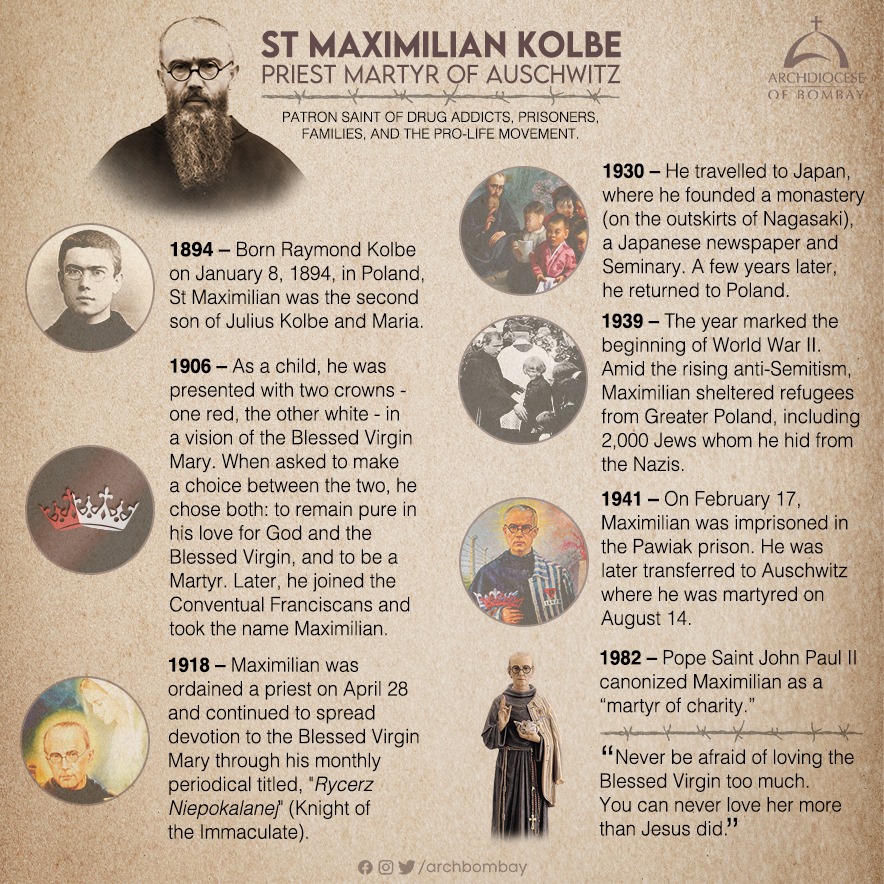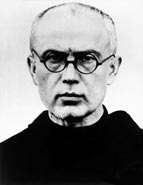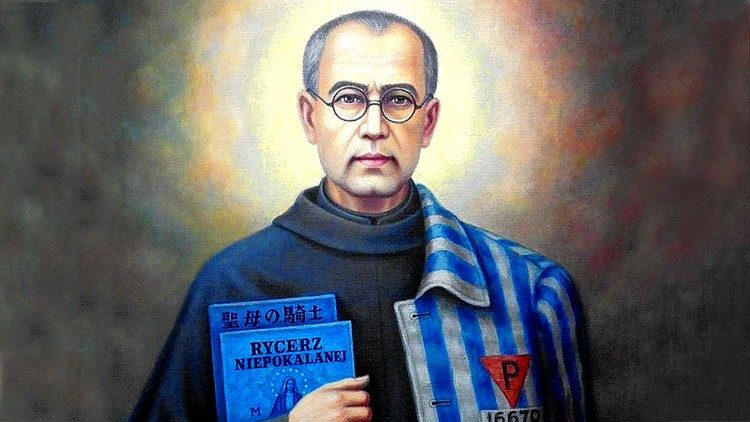
14 August
St. Maximilian Mary Kolbe (1894-1941)
Priest & Martyr
Born: 7 January 1894 at Zdunska Wola, Poland
Died: August 14, 1941, Auschwitz concentration camp, Poland
Canonized: 10 October 1982, Rome, Italy by Pope John Paul II
Major Shrine: Basilica of the Immaculate Mediatrix of Grace, Niepokalanów, Poland
Patron of: 20th century (Patron of our Suffering Century), Pro-Life Movement, drug addiction, drug addicts, families, amateur radio

Maximilian Mary Kolbe was born in Poland. He consecrated himself to the Lord in the Franciscan Order. Filled with love for the Virgin, he founded the Militia of the Immaculate Mary and, with his preaching and writing, undertook an intense apostolic mission in Europe and Asia. Imprisoned in Auschwitz during the Second World War, he offered himself in exchange for the father of a large family who was to be executed. He was given a lethal injection when he failed to die fast enough from starvation in the concentration camp. John Paul II proclaimed him the Patron of Our Suffering Century.
St. Maximilian lived in dark times yet wherever he went he radiated the light of God’s love and mercy. His life teaches us to entrust ourselves to our loving Mother, Mary Immaculate, and through her, to bring both our souls and the souls of others to the happiness of union with God. May we like him illumine the darkness of this world by the same fire of love. (Archdiocese of Bombay, Facebook)
COLLECT PRAYER
O God, who filled the Priest and Martyr Saint Maximilian Kolbe with a burning love for the Immaculate Virgin Mary and with zeal for souls and love of neighbor, graciously grant, through his intercession, that striving for your glory by eagerly serving others, we may be conformed, even until death, to your Son. Who lives and reigns with you in the unity of the Holy Spirit, God, for ever and ever.
Things to Do:
- From the Catholic Culture library, read The Holy Spirit and Mary, an explanation of St. Maximillian’s Marian theology and Maximillian Kolbe, Apostle of Mary by Fr. John Hardon.
- Offer a Mass, say a rosary for those who suffer in the world today from man’s inhumanity. Pray for an end to abortion, our nation’s own holocaust. Read about Auschwitz and ponder the modern gas chambers in every state of our Union and resolve to do all that you can to end the killing.
St. Maximillian Kolbe
St. Maximilian, born Raymond Kolbe in Poland, Jan. 8, 1894. In 1910, he entered the Conventual Franciscan Order. He was sent to study in Rome where he was ordained a priest in 1918.
Father Maximilian returned to Poland in 1919 and began spreading his Militia of the Immaculata movement of Marian consecration (whose members are also called MIs), which he founded on October 16, 1917. In 1927, he established an evangelization center near Warsaw called Niepokalanow, the “City of the Immaculata.” By 1939, the City had expanded from eighteen friars to an incredible 650, making it the largest Catholic religious house in the world.
To better “win the world for the Immaculata,” the friars utilized the most modern printing and administrative techniques. This enabled them to publish countless catechetical and devotional tracts, a daily newspaper with a circulation of 230,000 and a monthly magazine with a circulation of over one million. Maximilian started a shortwave radio station and planned to build a motion picture studio–he was a true “apostle of the mass media.” He established a City of the Immaculata in Nagasaki, Japan, in 1930, and envisioned missionary centers worldwide.

Maximilian was a ground-breaking theologian. His insights into the Immaculate Conception anticipated the Marian theology of the Second Vatican Council and further developed the Church’s understanding of Mary as “Mediatrix” of all the graces of the Trinity, and as “Advocate” for God’s people.
In 1941, the Nazis imprisoned Father Maximilian in the Auschwitz death camp. There he offered his life for another prisoner and was condemned to slow death in a starvation bunker. On August 14, 1941, his impatient captors ended his life with a fatal injection. Pope John Paul II canonized Maximilian as a “martyr of charity” in 1982. St. Maximilian Kolbe is considered a patron of journalists, families, prisoners, the pro-life movement and the chemically addicted.
Militia of the Immaculata
Source: Catholic Culture

St. Maximilian Kolbe: martyr of supreme sacrifice of life

The Polish priest was killed by the Nazis with a lethal injection on August 14, 80 years ago. The Catholic Church declared Kolbe Blessed in 1971 and canonized him as a martyr in 1982.
The Catholic Church on Saturday celebrated the feast of Polish martyr, St. Maximilian Kolbe. The 47-year-old Franciscan Conventual priest volunteered to die in place of a stranger 80 years ago on August 14, at the German Nazi concentration and death camp of Auschwitz in Poland.
St. Kolbe, the founder of the worldwide evangelization movement, Militia Immaculatae, and a missionary in Japan in the 1930s, faithfully followed the path of Christ’s sacrifice and His words in John’s Gospel: “No one has a greater love than this: to lay down one’s life for one’s friends”.
The priest was arrested in February 1941 on charges of aiding Jews and the Polish underground and was imprisoned in Warsaw. He was deported to the death camp of Auschwitz, Poland, where he was stripped of his Franciscan habit and assigned prisoner number 16670. He was forced to the most humiliating jobs, such as carrying dead bodies to the crematorium. Nevertheless, he continued his charity and priestly ministry, for which he was subjected to violent beatings by the guards.
A life donated
However, things took a dramatic turn at the end of July 1941, when a prisoner escaped from Auschwitz. In retaliation, the deputy camp commander picked up 10 men to be starved to death in an underground bunker to deter further escape attempts. When one of the selected men, Franciszek Gajowniczek, cried out, “My wife! My children!”, Kolbe volunteered to die in his place, arguing he was a Catholic priest and older than Gajowniczek, 41. The deputy commander accepted the offer.
St. Pope Paul VI, who described Kolbe as a “martyr of love”, said the priest offered his life in exchange for the life of a husband and father of 2 sons, who later recounted those dramatic moments. “Kolbe left the ranks, risking being killed on the spot, to ask the camp leader to replace me,” Gajowniczek said. “It was not conceivable that the proposal would be accepted, indeed much more likely that the priest was added to the ten selected to die of hunger and thirst together,” he added.
“Starvation bunker”
The Polish priest and others were thus locked up in the “starvation bunker” without food and water. According to an eyewitness, who was an assistant janitor at that time, Kolbe led the prisoners in prayer. Prison guards found him standing or kneeling in the cell and looking calmly at those who entered. After they had been starved and deprived of water for two weeks, only Kolbe remained alive.
The prison authorities who wanted the bunker emptied, made short work of Kolbe on August 14, 1941, with a lethal injection of carbolic acid. Kolbe is said to have raised his left arm and calmly waited for the injection. Before dying, he pronounced the two words, “Ave Maria”, the final pledge of a life entrusted to the Immaculate Conception. His remains were cremated on 15 August, the feast of the Assumption of Mary.
Saint and martyr
In his homily at the canonization Mass of Kolbe on October 10, 1982, St. John Paul II said, “Death suffered for love, in place of the brother is a heroic act of man, through which, together with the new Saint, we glorify God.” In fact, it is from God that the grace of such heroism and this martyrdom comes, he said.
During his general audience of August 13, 2008, Pope Benedict XVI recalled the words of Kolbe in the face of the fury and hatred of Nazi persecution: “Hate is not a creative force: only love is”. The Pope explained love is precisely the distinctive trait, the imperishable legacy of the saint that the Church remembers on August 14, on the eve of the solemnity of the Assumption of the Blessed Virgin Mary.
During his visit to Poland in 2016, Pope Francis on July 29 visited the “starvation bunker” where Kolbe breathed his last in Auschwitz. After a moment of silence and reflection, he left, signing the visitors’ book with a brief prayer: “Lord, have mercy on your people, Lord, forgive us for so much cruelty”.
Indian Cardinal Oswald Gracias of Bombay delivered a homily during an online Mass on Saturday. He briefly reflected on last years of St. Maximilian Kolbe.